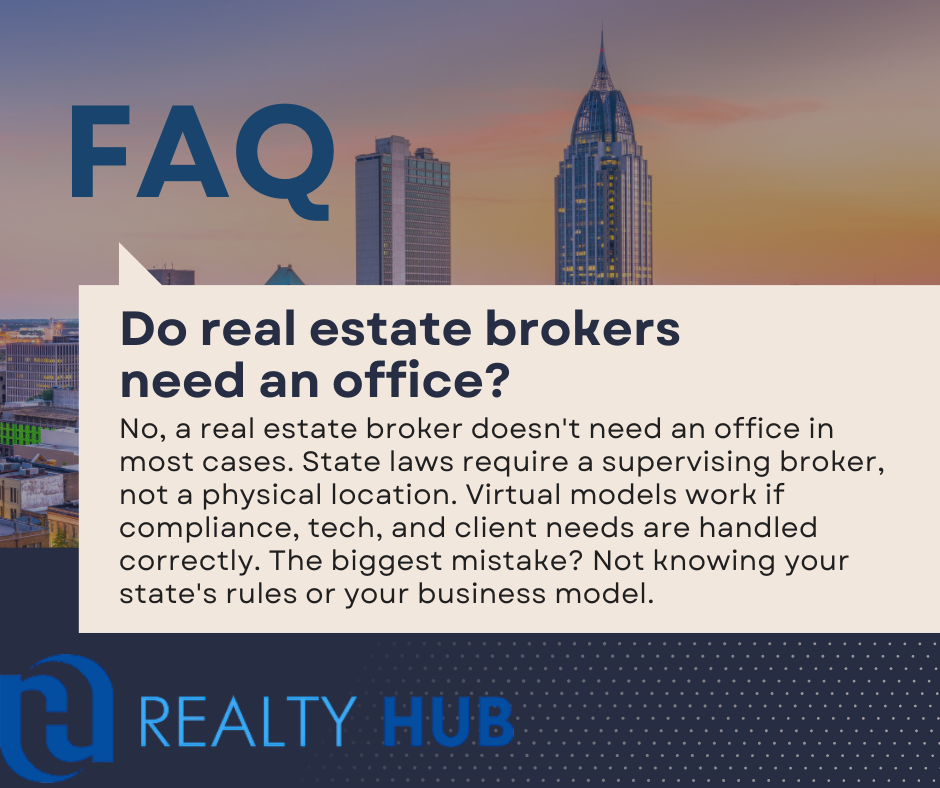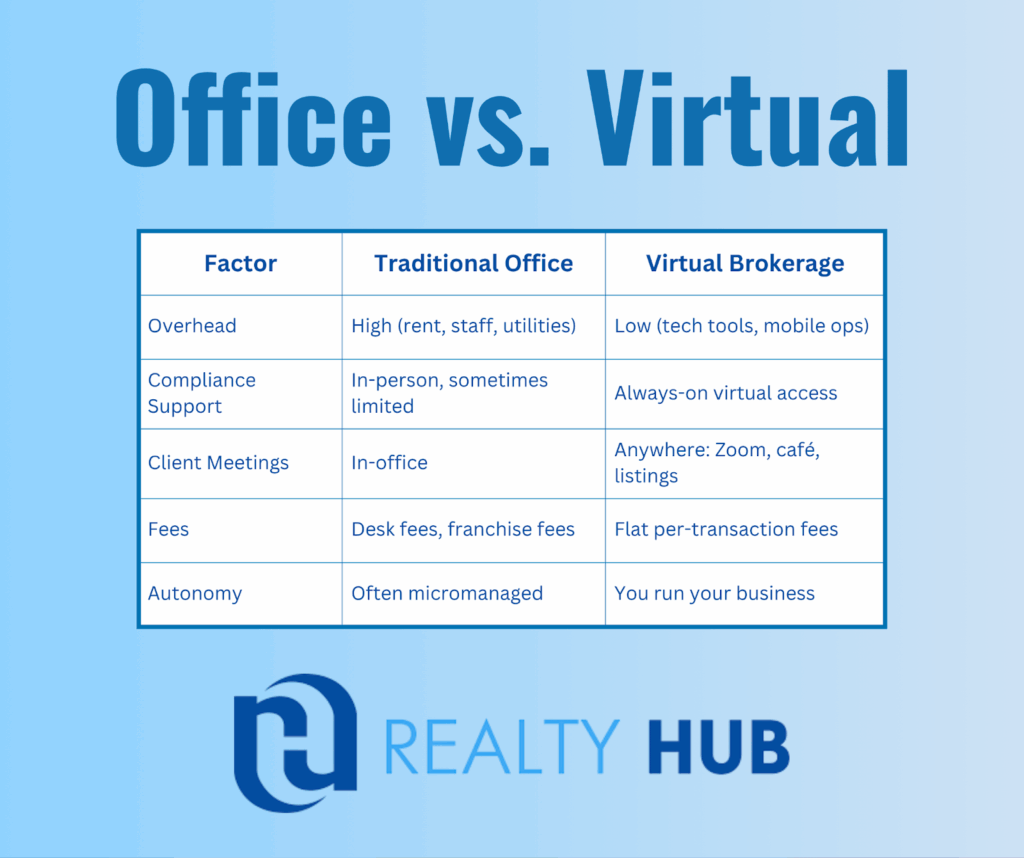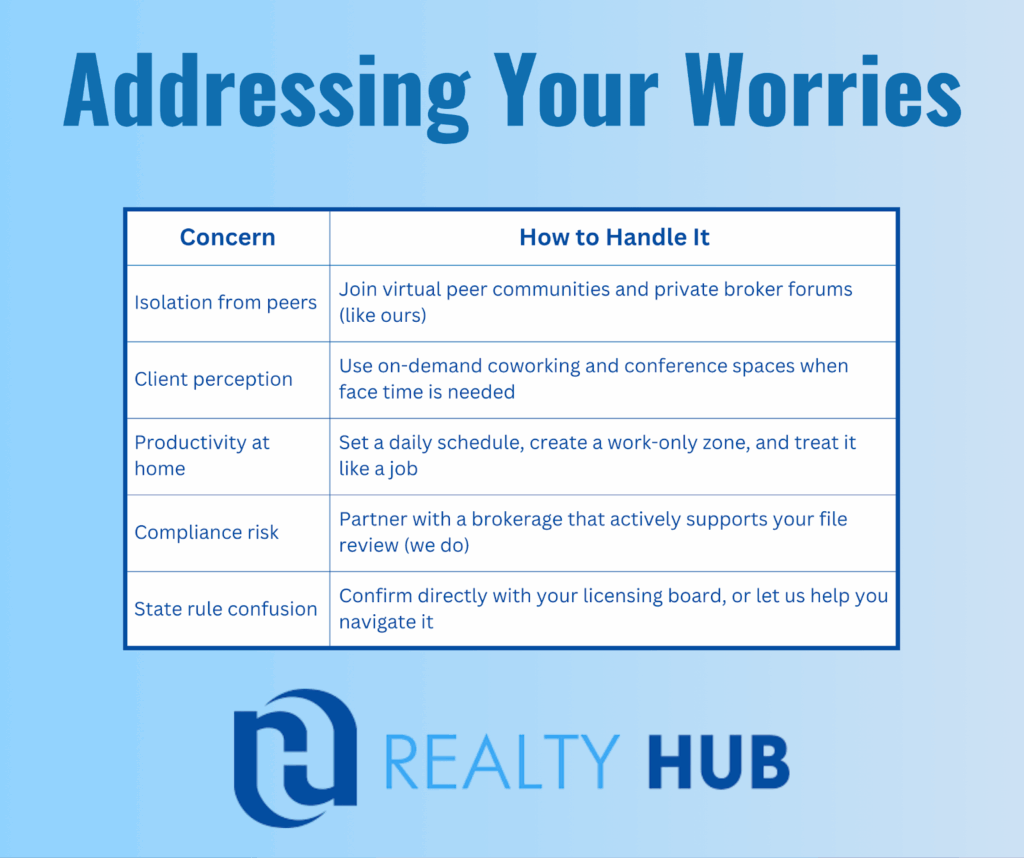No, a real estate broker doesn’t need an office in most cases. State laws require a supervising broker, not a physical location. Virtual models work if compliance, tech, and client needs are handled correctly. The biggest mistake? Not knowing your state’s rules or your business model.

If you’re an agent trying to decide whether you need an office, the real question isn’t about square footage. It’s about:
- How you plan to meet compliance requirements
- How you’ll serve clients professionally
- Whether you want the freedom to control your overhead
At Realty Hub, we’ve built a model specifically for agents who want maximum independence without sacrificing legal oversight. For $100 per year and $100 per transaction, you keep 100% of your commission while we handle compliance, supervision, and broker support, all fully virtual. You don’t need an office to run a real estate business; you need the right platform behind you.
If that’s what you’re looking for, you’re in the right place. But if you want a full-time desk, mandatory office meetings, and franchise quotas, we’re probably not your brokerage.
Keep reading if you want the full breakdown: when an office helps, when it doesn’t, and how brokers like us eliminate the office question entirely.
Is an Office Legally Required?
Not anymore, at least not in the way most agents think.
In most states, a physical office is not required. What is required is a managing broker who takes legal responsibility for compliance, transaction oversight, and record-keeping. That means whether your brokerage has a 5,000-square-foot suite or operates entirely in the cloud, the core requirement is supervision, not square footage.
That said, some states do ask for a registered office address. But here’s the nuance: this doesn’t have to be a traditional office. A registered mailing address, coworking space, or even a virtual office arrangement often meets state guidelines. The key is meeting the regulatory language without incurring unnecessary overhead.
Compliance doesn’t care where you sit. It cares that someone qualified is overseeing your activity, your documents are audit-ready, and your clients are protected. At Realty Hub, we handle all of that virtually, across Florida, Georgia, and Alabama, so our agents don’t need to worry about whether they “have enough office space.” We’ve built systems to keep you compliant, not confined.
What Is an Office in Real Estate?
Traditionally, an office was where real estate happened, think filing cabinets full of contracts, phones ringing off the hook, and walk-in traffic from street-facing signage.
Today, that model is outdated.
An “office” in real estate now simply means a location (physical or digital) where licensed agents are supervised by a broker. That’s it.
In the past, offices served purposes like:
- Storing paper contracts and disclosures
- Hosting in-person closings
- Giving clients a place to “see your legitimacy”
Today, we accomplish all of that through:
- Cloud-based document storage and digital signatures
- Remote notaries and mobile closings
- Branded digital assets, CRM automation, and online credibility
The world has shifted, and the real estate office has too.
What Is a Brokerage Office?
Legally, a brokerage office is the licensed business entity responsible for housing real estate agents. It’s where your license “hangs.” More importantly, it’s the party legally accountable for:
- Supervising transactions
- Ensuring compliance with state laws
- Managing trust accounts for client funds
That office doesn’t have to be a place you walk into. With Realty Hub, our brokerage exists virtually, but the responsibilities are the same, and we take them seriously. Our compliance team reviews documents, our systems store everything securely, and our broker is just a message away.
So yes, a brokerage office is required. But brick and mortar is optional.
The Biggest Mistake Real Estate Agents Make
Too many agents focus on the wrong details, and miss the ones that matter.
Here’s what we’ve seen derail real estate careers:
- Overlooking state-specific licensing rules. Every state has its own requirements. Assuming you’re compliant because a friend in another market is can get you fined or worse.
- Not confirming if a virtual model checks the legal boxes. Virtual brokerages are viable, but only if the platform you join has real compliance systems in place. At Realty Hub, that’s our foundation.
- Falling for “too good to be true” recruiting scripts. Free leads, “top training,” and hidden tech packages sound exciting, until you see your first check and wonder where your commission went.
- Paying for office space you’ll never use. Many agents never step foot in the office they’re funding through desk fees and franchise dues. It’s a quiet cost that adds up fast.
The real mistake isn’t going virtual. It’s going in blind.
Office vs Virtual: Key Differences
We get asked this a lot, what’s the real difference between a traditional office model and a virtual brokerage? Here’s a snapshot:

With Realty Hub, everything you need is accessible online, including your broker. We support agents across Florida, Georgia, and Alabama with full compliance coverage and zero fluff.
When You May Still Want an Office
Let’s be real, going virtual doesn’t fit everyone.
There are situations where a traditional or hybrid setup may work better:
- Luxury market pressure. Some high-end clients still expect a formal office to “feel” legitimacy.
- Team-based models. If you’re managing a team that thrives on face-to-face collaboration, a shared physical space may be valuable.
- Self-management challenges. Not everyone thrives solo. If home distractions kill your productivity, a small office or coworking pass might be worth the investment.
But for the majority of independent, self-motivated agents? A smart virtual setup wins every time.
State Licensing: Do You Have to Have an Office?
Here’s where things can get technical, and where mistakes are made.
Every state has its own licensing framework. Some require a “principal place of business” or a registered address. But that doesn’t mean you need a traditional office.
- In many cases, a virtual address or coworking space satisfies legal minimums.
- States like Florida, Georgia, and Alabama, where we operate, fully allow virtual supervision if brokers meet compliance standards.
- What matters most is who’s overseeing your license, not where they sit.
Bottom line: check with your state’s real estate commission, or ask us. We’re happy to help our agents navigate it from the start.
Top Agent Worries (and Solutions)
Let’s address the five concerns we hear most often from agents considering a no-office model, and how to solve them.

How Successful Virtual Agents Operate
Top-performing agents who work virtually don’t “wing it”, they build systems.
Here’s what they consistently do:
- Use cloud-based platforms for document management and compliance
- Keep in touch with their broker, even remotely
- Network online and offline to maintain a local presence
- Rent conference space for client-facing meetings as needed
- Stay honest with clients about their setup, transparency builds trust
Virtual doesn’t mean less professional. It means lean, strategic, and mobile.
How Realty Hub Solves the Office Question
If the only thing keeping you in a traditional brokerage is a fear of “needing an office,” we’ve got good news:
You don’t need one. You need a platform that works.
Here’s what we’ve built for agents who value autonomy:
- Flat-fee model: $100/year and $100/transaction. That’s it.
- E&O insurance included in every deal
- No desk fees, no franchise dues, no forced tech subscriptions
- Fully virtual compliance and broker supervision in Florida, Georgia, and Alabama
- Freedom to run your business your way, no quotas, no meetings, no micromanagement
Whether you’re a top producer, part-time investor, or referral-only agent, our infrastructure supports you without locking you into an office lease or a bloated compensation plan.
Join Realty Hub today and start earning more on your terms.
Frequently Asked Questions (FAQ)
What is the best business structure for a real estate agent?
Most agents eventually form an LLC or elect S-Corp status for three key reasons:
- Tax advantages
- Personal liability protection
- Separation of business and personal income
If you’re just starting out, a sole proprietorship may work for now. But once you begin to scale, talk to a CPA, it could save you thousands.
Can I run my real estate business without an office?
Absolutely. You can manage your entire business from a laptop. Here’s how to make it work:
- Use cloud-based tools for document storage, forms, and compliance
- Invest in a reliable e-signature platform (check your state’s rules on notarization)
- Renta coworking space if you need occasional in-person meetings
- Use a mobile-friendly CRM to track leads and deals
- Make sure your brokerage provides Errors & Omissions (E&O) insurance, Realty Hub includes this for all agents
Can I hang my real estate license without office space?
Yes, and that’s exactly what Realty Hub is built for. We offer agents the ability to “park” their license, stay active, and remain compliant, all without setting foot in a traditional office. Our flat-fee model supports independent agents who prefer a virtual setup.


